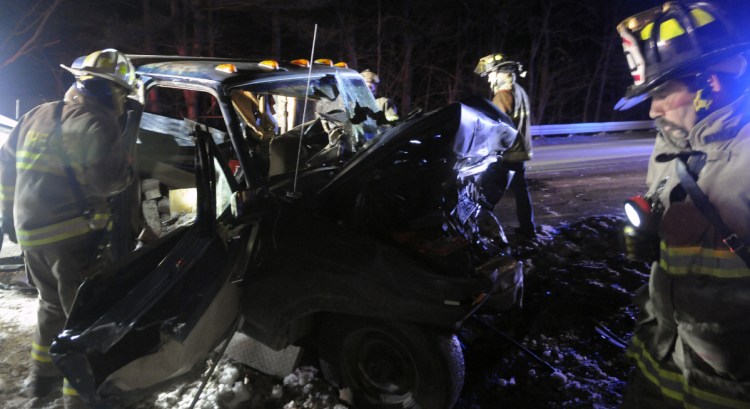Maine’s highest court upheld a Farmingdale man’s drunken-driving conviction in connection with a 2016 crash in Chelsea that left three people — including him — with serious injuries.
Rowe L. Palmer, now 39, had appealed the conviction to the Maine Supreme Judicial Court, also known as the Law Court, saying the blood drawn for an investigator at the hospital was illegal because it was done without a warrant.
In an opinion published Thursday, the court said that it was legal under a “now or never” situation because Palmer was scheduled for immediate surgery after the crash on Jan. 4, 2016.
“A circumstance that does justify a warrant-less seizure is a ‘now or never’ situation — in other words, where an officer cannot ‘reasonably obtain a warrant before a blood sample can be drawn without significantly undermining the efficacy of the search,'” wrote Supreme Court Associate Justice Jeffrey Hjelm, writing for the six-judge panel.
Attorney Jeremy Pratt, who represented Palmer in the appeal, said Thursday via email he had no comment on the decision.
Palmer was convicted by a jury in October 2017 in Augusta of aggravated criminal operating under the influence and aggravated assault, both in connection with the head-on crash on Route 9. He was sentenced to an initial three years behind bars, followed by five years suspended while he spends three years on probation.
Both charges were aggravated because of the serious injuries that resulted.
While the sentence was put on hold and Palmer remained free pending the result of the appeal, District Attorney Maeghan Maloney said Thursday via email that Palmer “violated the stay by driving after consuming alcohol. We petitioned the court to revoke his bail and the court agreed. He started serving his sentence in December, thus he is already in execution of his sentence.”
According to the Department of Corrections website, Palmer is serving the sentence at the Bolduc Correctional Facility, and his release date is April 28, 2020.
He was fined $2,100 and ordered to pay $8,696 restitution, and his license and registration privileges were suspended for six years. Palmer had no prior criminal record, his attorney said.
Hjelm included the circumstances of the crash in the opinion, noting that Palmer’s truck crossed the centerline of a 45-mph road and struck another truck head-on about 4 p.m. that day.
Palmer was hurt, as were Richard R. and Monique Morin, of Randolph, the couple in the other truck. All three had to be cut free to get them out of their mangled trucks.
During Palmer’s trial, the Morins described their injuries.
Richard Morin, who had just retired at the time of the crash, was taken away by helicopter and hospitalized for a month, then spent another three months in rehabilitation and a nursing home. Maloney previously had said that Morin never would walk normally after both of his femur bones were broken above his knees, among other bone injuries. Maloney also said that Monique Morin’s right foot could be amputated because it was crushed in the crash and had yet to heal.
On Thursday, Maloney praised the couple.
“The victims in this case are a wonderful, courageous couple who suffered mightily and continue to suffer from their injuries,” she wrote. “Rowe Palmer is the poster child for why no one should drive when impaired by alcohol or any intoxicating substance. The harm caused is enormous.”
Darrick Banda, the attorney who represented Palmer at the trial, argued that the state failed to provide evidence that Palmer was under the influence of alcohol at the time of the crash, and that results of a blood-alcohol test taken before Palmer entered surgery at the hospital should have been suppressed from evidence.
In November 2016, Justice Robert Mullen rejected the defense motion to have that evidence suppressed; however, he did suppress the results of another blood test that was done in the ambulance on the way to the hospital. At one point, an assistant district attorney said results showed Palmer’s blood alcohol content was 0.131 three hours after the crash. The legal limit for those over age 21 in Maine is 0.08.
Hjelm wrote that the investigating officer, Deputy Jacob Pierce, of the Kennebec County Sheriff’s Office, saw that the blood kit used in the ambulance had expired and returned to the hospital after obtaining an unexpired one. Hjelm noted that while Pierce did not notice the odor of alcohol, “While waiting for a member of the medical staff to arrive to take a blood sample, however, Pierce overheard Palmer tell his family that he had consumed ‘a few beers with lunch.'”
Betty Adams — 621-5631
Twitter: @betadams
Send questions/comments to the editors.




